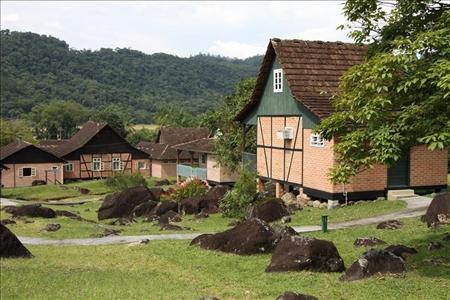Brazil: Replacing Old Clichés with a New View on German Culture

In 1824, the first German emigrants arrived in Porto Alegre, in the south of Brazil, and founded the first German colony, named Sao Leopoldo. They referred to the German Archduchess Leopoldine, from the House of Habsburg, who brought the first settlers from Germany to Brazil after her marriage to the later Brazilian Emperor Pedro I.
Even today you can experience in cities like Blumenau, Novo Hamburgo, or Sao Leopoldo how people lived in some parts of Germany about 100 years ago. Here, old customs and cultures are maintained, which in many other Brazilians represent a picture of Germany, which is often characterized by traditional memories of the home of our ancestors and by outdated clichés.
The German-Brazilian symbiosis employs cultural scientists and historians alike. The director of the Martius Staden Institute in São Paulo, Eckhard Kupfer, is promoting a new, "polished" image of Germany. He initiated a traveling exhibition about the natural scientist Fritz Müller, who also emigrated to Brazil in the mid-19th century and made a very important contribution to Darwin's theory of evolution with his observations. Kupfer says, "Everyone knows Darwin, but only a few know Fritz Müller". The German natural scientist was in close correspondence with Darwin for 16 years and regularly informed him about his observations in the partly still untouched nature of Brazil. Charles Darwin later once called him the "Prince of Observers".
The German language is also back in fashion. The Goethe Institute in Porto Alegre is registering an increasing number of German courses. Many of the young Brazilians already have previous knowledge of German and would like to transform this, from the local traditional dialect, into pure High German, because they would like to be understood in "real Germany". Goethe-Institut director Reinhard Sauer has been living in Brazil for 18 years. His aim is to promote the outdated image of Germany in Brazil. Instead of focusing on the Bavarian Oktoberfest culture or the castle of fairy-tale king Ludwig II at Herrenchiemsee, he wants to focus more on an intellectual debate with German philosophers at the Goethe-Institut.
There is a growing interest in events on the classical German philosophers, such as Kant, Hegel, Schopenhauer, Nietzsche, and Heidegger, or even the contemporary ones, such as Peter Sloterdijk. The German playwright Berthold Brecht has a great influence on Brazilian theater-makers and hardly anyone involved in dance in Brazil does not know the name Pina Bausch and the Tanztheater Wuppertal. German culture has become an indispensable part of everyday Brazilian life. Be it German fairy tales, classical music, current electronic music, literature, or cinema.
Source: dw.de

